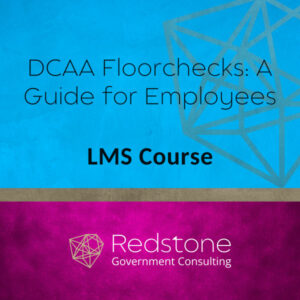Overview
Redstone Government Consulting has created an affordable, subscription-based solution for employee awareness of government contract compliance expectations. Regular training on employee responsibilities regarding their performance under government contracts is a critical control required in all business system areas. An educated workforce illustrates the company’s commitment to compliance with external auditors, provides an additional avenue for identifying employee concerns regarding potential non-compliances, and provides assurance that should a problem occur, the company has done its part to mitigate risks of non-compliance.
The Redstone Learning Management System is a turnkey solution for educating your employees on recurring compliance responsibilities and offers ease of use, value, and peace of mind for government contractors. Employee training is an essential element of developing a government compliance infrastructure. The use of courses accompanied by support from the Redstone GCI consulting team to develop compliant policies/practices while evaluating their effectiveness through recurring monitoring provides a total solution. This is effective for maintaining your business system adequacy and providing effective risk mitigation from costly non-compliance problems.
Human Resources (HR) Course Package
This course package is available as a complete course containing 7 modules. CPE is not offered for these training course modules or the training course package.
Course Overview
This Human Resources (HR) course package includes modules for critical areas of employee annual training and new employee onboarding training. Each module touches on a different topic that is either required or strongly recommended for training employees of government contractors. The modules address timekeeping requirements, DCAA floorchecks, preventing harassment and discrimination in the workplace, business ethics (FAR 52.203-13), drug-free workplaces, and anti-human trafficking. In addition, the modules will address what DCAA reviewers look for when reviewing contractor policies and procedures and the documentation needed in company files.
Individual Modules
Contractor Purchasing System Review (CPSR) Course Package
This course package is available either as a complete course containing 11 modules or each module can be purchased individually. CPE is not offered for these training course modules or the training course package.
Course Overview
This CPSR course package includes modules for the significant areas in a contractor’s purchasing system. Each module touches on the DFARS 252.244-7001 Contractor Purchasing System Administration criteria for the particular topic. The modules address FAR clauses and the required criteria, information that should be included in policies and procedures, areas to consider when performing the requirements, and documentation. In addition, the modules will address what the DCMA CPSR reviewers look for when reviewing contractor policies and procedures and the documentation in the purchasing/subcontract files.
Individual Modules
Additional Featured Courses
CPE is not offered for these training course modules or the training course package.






















































